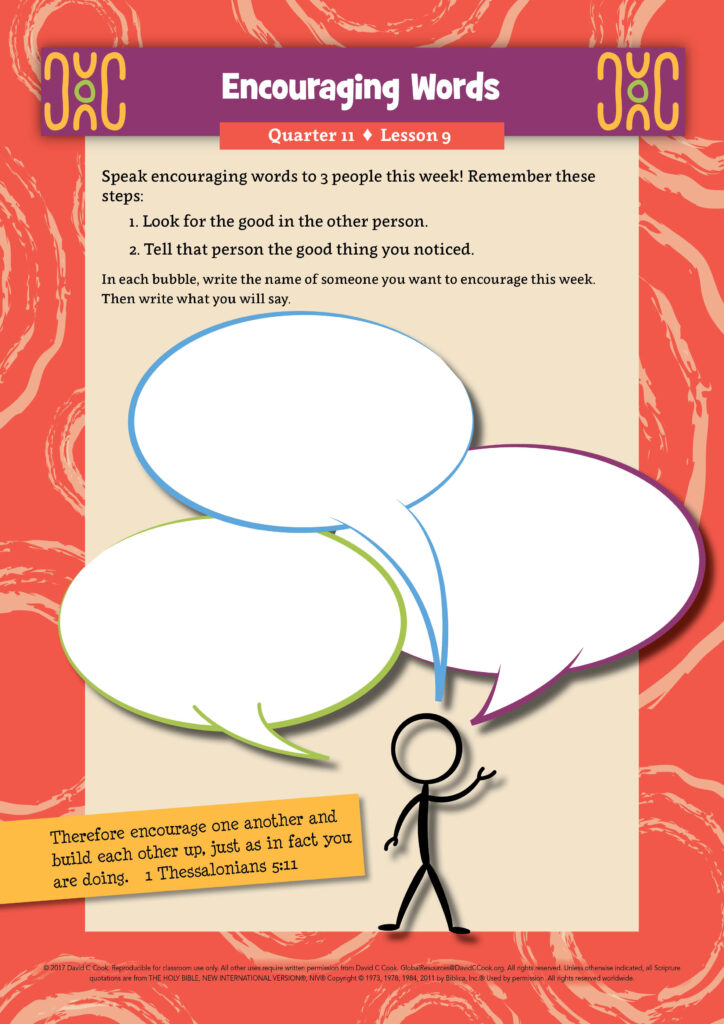During the lesson, the information for you to know is written in regular type, and what we suggest speaking or reading aloud to children is in bold. All resources for this lesson, including the Teacher Guide, Student Page, Family Connection Card, and other resources can be downloaded in a ZIP file by clicking on the following link:
In some lessons you will find "resource articles." These are articles written by experts from around the world to help equip you for your work with children and adolescents. Share them with parents or guardians if you consider it appropriate.
Before class, clear a large space for the activity at the beginning of class. Use the stick to draw 2 lines on the ground, 1 at each end of the space.
Therefore encourage one another and build each other up, just as in fact you are doing.
1 Thessalonians 5:11
All of us face situations that are frightening, confusing, or difficult in this life. Yet if someone speaks encouraging words to us, we receive renewed hope and strength for our situation. That is how the body of Christ is meant to work—strengthening and encouraging one another. When you encourage others you fill them with courage, strength, and hope.
This week, look for ways to fill others around you with courage and hope. Ask God to help you notice which family member, friend, neighbour, or student needs encouragement in some area. Then ask the Holy Spirit to give you the right words that will fill that person with the courage he or she needs.
Let your children’s families know that this week the children will learn about using encouraging words. Encourage families to look for opportunities to say encouraging things to one another.
Teacher Tip: If possible, email or text the Family Connection Card to the families of your students.
As your children arrive, speak an encouraging word to each one.
Gather the children behind the line on one end of your space. Explain to them that they will play a team-building game. They must help each other and work together as a team to succeed.
Imagine that the space between the 2 lines is a pool of quicksand—loose, wet sand that sucks things up! The quicksand is spreading closer to the group every minute. You must get everyone safely across the quicksand to the opposite line.
Show children the line on the other side of the space.
To get everyone safely across, you must follow these 2 rules:
Only 1 person can touch the quicksand at any time. If 2 people touch the quicksand at the same time, they get sucked in and must return to the beginning.
Teammates must cross in pairs. If someone enters the quicksand alone, she gets sucked in and must return to the beginning.
You must think creatively about how you can get your group across safely!
Give the children about 5 minutes to think of a plan and cross the quicksand. Do not offer ideas to help unless it is necessary. Let the children work together to achieve their goal. Once all the children successfully cross the quicksand, have everyone sit down.
What did you do to successfully get everyone across the quicksand safely?
You worked together! Some of you lifted others up, and some of you allowed others to carry you. For the next few weeks, we will learn about the power of our words. Encouraging words help others and lift them up, just as many of you lifted each other up during our activity.
Today we will focus on encouraging words. When we speak encouraging words to people, we help build their confidence. Our words can give them the confidence they need to make a good decision or confidence when they face a hard situation.
The Bible tells us that giving encouragement is important. Everyone stick out your tongue. Your tongue can be used to encourage or build up others, or it can be used to tear others down.
We will hear what the Bible says about encouraging words.
Read this verse 2 times.
A tongue that calms is like a tree of life. But a tongue that tells lies produces a broken spirit.
Proverbs 15:4, NIrV
Encouraging words help calm people’s fears. What does this verse compare healing
words to?
A tree of life.
What does a tongue that tells lies produce?
A broken spirit.
Read this verse 2 times.
The tongue has the power of life and death, and those who love it will eat its fruit.
Proverbs 18:21
We use our tongues to form our words. What do you think it means that the tongue has the power of life and death?
It can bring helpful or harmful words to others. It can encourage or tear down others.
Remember that God had used Moses to lead the Israelite people out of slavery in Egypt. Then he led them for 40 long years as they travelled through the desert. All the time Moses was leading the people, there was a young man named Joshua who was his helper. Finally they were ready to enter the land God had promised to them.
God told Moses that Joshua would be the person who would lead the people into the land. Listen to what God told Moses to say to Joshua:
So appoint Joshua as the new leader. Help him to be brave. Give him hope and strength. He will take these people across the Jordan. You will see the land. But he will lead them into it to take it as their own.
Deuteronomy 3:28, NIrV
God wanted Moses to encourage Joshua because leading the people was a big job. God knew Joshua would need that encouragement. As a matter of fact, after Moses had died and Joshua and the people were about the enter the land, God Himself encouraged Joshua. Listen to God’s words to him:
No one will be able to stand against you all the days of your life. As I was with Moses, so I will be with you; I will never leave you nor forsake you. Be strong and courageous, because you will lead these people to inherit the land I swore to their ancestors to give them. Be strong and very courageous. Be careful to obey all the law my servant Moses gave you; do not turn from it to the right or to the left, that you may be successful wherever you go. Keep this Book of the Law always on your lips; meditate on it day and night, so that you may be careful to do everything written in it. Then you will be prosperous and successful. Have I not commanded you? Be strong and courageous. Do not be afraid; do not be discouraged, for the Lord your God will be with you wherever you go.
Joshua 1:5–9
Wow! God had some strong words of encouragement for Joshua. He said some words to Joshua 3 times! I will read these verses again and you will listen for the words that God repeated.
Read the verses again to the children.
What words did God say 3 times to encourage Joshua?
Be strong and courageous.
God knew Joshua would face battles and difficulties. He wanted Joshua to be encouraged—filled with confidence. As Joshua led the people for many years, he would often encourage them. When you are encouraged, you can encourage others too!
If you are in situations where you are scared, angry, or frustrated, it may be easier to tear others down than to build them up. Here are 2 steps that can help you be an encourager:
Have the children find partners. Explain that you will read a situation. One partner will be the child in the situation. The other partner will speak encouraging words to her using the steps they just learned. First, look for the good in the other person. Second, tell the person the good thing you noticed. Have the partners switch roles and read the second situation.
Have the children remain with their partners, but ask the entire class the following questions.
This week, let’s all try to say encouraging words to 3 people in our lives. Tell your partner the names of 3 people you want to encourage this week. They should be people you see often, such as family members, teachers, or friends.
Give the partners 1 minute to share.
Now think quietly about each person you named. What is something good you have noticed in each person? These might be character traits, skills, or good decisions they have made.
Pause for the children to think quietly.
Now let’s practice saying the words of encouragement we will say to our 3 people this week. Pretend your partner is the first person you named. Tell her the encouraging words you will say to that person this week. Then switch and have your partner do the same to you. Do this for each of your 3 people.
Give the partners about 5 minutes to do this activity. When the children have finished sharing, gather the class together.
Optional: If you are using Student Pages, the children can plan their encouraging words on them.

Look for an opportunity to encourage each of these people this week with the words you just practiced. God has given you the special gift of encouraging words. Use it to bring life and healing to those closest to you.
If you are using the Memory Verse Poster, show it to the students.
Therefore encourage one another and build each other up, just as in fact you are doing.
1 Thessalonians 5:11

Close class by speaking the blessing, based on 1 Thessalonians 5:11, over the children.
Blessing: May you use your words to fill others with strength, hope, and courage. May God strongly encourage you so you can build others up!
Lead the children in singing this quarter’s song, if possible.
Life on Life ©2020 David C Cook. Reproducible for home or classroom use only. All other uses require written permission from David C Cook [email protected]. All rights reserved.